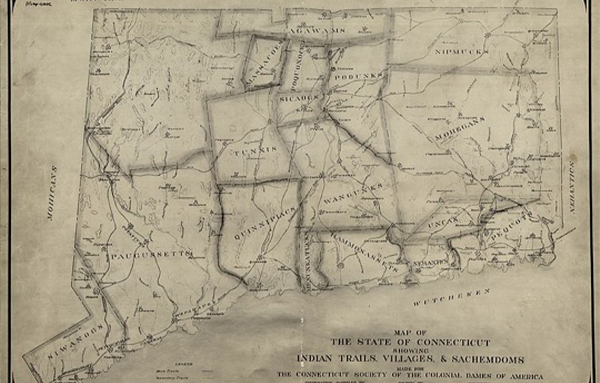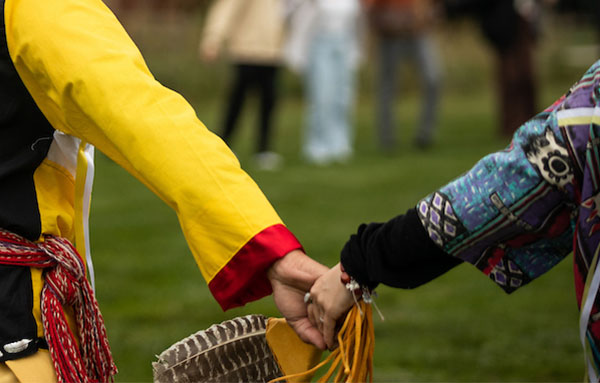University of Hartford Land Acknowledgement Statement
We acknowledge that the University of Hartford resides on the historic homelands of the Poquonocks, Wangunks and Tunxis; and that what is now called Connecticut encompasses the homelands of the Wappinger, Schaghticoke, Golden Hill Paugussett, Mohegan, Mashantucket Pequot, Eastern Pequot, Nipmuc, Quinnipiac, Niantic, and Lenape, as well as other Indigenous Peoples. We honor, respect, and appreciate the relationship that exists among these communities, nations, lands, and waterways, and aspire to uphold our responsibilities according to their example of stewardship.
For many years there was interest in creating a University of Hartford land acknowledgement statement. The initiative was initially taken up by a Faculty Learning Community and took shape during the 2021-2022 academic year. Driven by the mission of indigenous acknowledgement, a group of dedicated faculty, staff, and students came together for this important purpose.
Following approval by the President's Cabinet, and along with representatives from the Golden Hill Paugussett and other local tribes, the University launched the Land Acknowledgment initiative on Monday, October 10, 2022, Indigenous People's Day.
Along with our community, support for the event was also provided by the Office of Inclusive Excellence and Belonging, the University Interdisciplinary Studies program, the Hartt School, and the Center for Montessori Studies.
Departments, student organizations, and other groups holding events and gatherings on the University of Hartford campus are encouraged to engage with the University of Hartford Land Acknowledgement Statement that appears below, and to use it in a manner that is reflective of the intentions with which it is offered — acknowledging the history of this region and committing to amplifying the voices of the tribes upon whose ancestral lands our University sits.
The Land Acknowledgement Statement (full or abbreviated version) can be included in written correspondence (for example, an email signature or as part of a class syllabus), read aloud in class at the beginning of the semester or at other University events, and/or distributed on University property by anyone who wishes to do so.
There are no requirements for the use of the land acknowledgment statement at events and gatherings, in materials, on course syllabi, or other University documents. When the option to use the land acknowledgment statement is exercised, it should be in a manner that is respectful of the Indigenous Peoples it honors.
It is important that this be the only Land Acknowledgement used at the University of Hartford. A great deal of care, effort, and research went into drafting our formal land acknowledgment statement to ensure its accuracy, including consultation with Clan Mother Shoran Waupatukuay Piper of the Golden Hill Paugussett.

- Sicaog (SUK-ah-awg)
- Poquonock (Poe-kwa-nick)
- Wangunk (Won-guhngk)
- Tunxis (Tunx-is)
- Wappinger (WAH-pin-jer)
- Schaghticoke (SKA-teh-coke)
- Golden Hill Paugussett (peh-GWAH-ssett)
- Mohegan (Mo-he-gan)
- Mashantucket Pequot (Mash-uh-tuck-it Pea-kwaht)
- Eastern Pequot (Pea-kwaht)
- Nipmuc (Nip-muck)
- Quinnipiac (Kwi-nuh-pee-ak)
- Niantic (Nai-an-tuhk)
- Lenape (Leh-NAH-pay)
Books
Local
-
"Connecticut's Indigenous Peoples," Lucianne Lavin (2015)
-
“If You Lived During the Plimoth Thanksgiving,” Chris Newell (Scholastic, 2021)
-
“Quarter-Acre of Heartache: The Golden Hill Indians of Connecticut," by Claude Clayton Smith & Aurelius Piper (1985)
-
"Red Road: Traditional Voice of Afro-American America," by Shoran Waupatukuay Piper (2021)
-
"The Rediscovery of America: Native Peoples and the Unmaking of U.S. History, by Ned Blackhawk (2023)
National
-
“Braiding Sweetgrass,”Robin Wall Kimmerer (2015)
-
“An Indigenous Peoples' History of the United States,”Roxanne Dunbar-Ortiz (2014)
-
“They Called Me Uncivilized: The Memoir of an Everyday Lakota Man from Wounded Knee,” Walter Littlemoon & Jane Ridgway (2009)
-
“Stringing Rosaries: The History, the Unforgivable, and the Healing of Northern Plains American Indian Boarding School Survivors,” Denise K. Lajimodier (2019)
Events Connected to UH Community
Land
-
Honoring Original Indigenous Inhabitants: Land Acknowledgment
-
'I regret it': Hayden King on writing Ryerson University's territorial acknowledgement
Languages
Maps
-
“American Transformed: Mapping the 19th century.” Boston Public Library exhibit on effects of westward expansion on Native communities.
Organizations (local)
Podcasts
Videos/Documentaries/Movies/Shows
Websites
-
Akomawt—Connecticut-based educational team working to change the narrative around how Native American culture and history is taught and understood
Amplifying Indigenous Voices Affinity Network
The “Amplifying Indigenous Voices” Affinity Group was formed at UHart with guidance from the Golden Hill Paugussett tribe. It's composed of faculty and staff who share a sense of identity, interest, or experiences related to Indigenous people. Through the creation of a mission statement, goals, and action items, they aim to foster a sense of community and awareness around this native land.
For more information, or to join the group, please contact Judy Wyman or Bevin Rainwater.
Mission and Goals

We, the leadership at the University of Hartford, consistent with the University’s commitment to inclusive excellence and belonging, pledge to acknowledge, uphold, and integrate into campus culture the following goals with respect to Indigenous peoples and communities.
Work with Indigenous communities to:
-
Disseminate knowledge about and amplify voices of Indigenous peoples and communities
-
Foster relationships and partnerships with Indigenous peoples and communities
-
Enrich academic opportunities for and about Indigenous peoples and communities
-
Recognize historical legacies and current contributions of Indigenous peoples and communities
-
Increase enrollment efforts among Indigenous communities
Action Items
Achieve these goals through action steps, such as:
-
Consulting with local tribes, including the Golden Hill Paugussett
-
Crafting, disseminating, and providing guidelines for use of a Land Acknowledgement
-
Acknowledging and celebrating Indigenous Peoples’ Day on the University calendar and elsewhere as appropriate
-
Supporting the creation of an affinity network
-
Sustaining and expanding academic course offerings inclusive of, but not limited to, Indigenous history, religion, and cultural expression
-
Coordinating and developing annual programming during Native American Heritage Month, as well as throughout the year
-
Developing and distributing campus markers to educate the campus community about indigenous plants and wildlife, and connections to the land and its Indigenous history.
For more information, or to join the group, please contact Judy Wyman or Bevin Rainwater.
Events
We meet monthly via teams and have events throughout the academic year to promote indigenous culture and education and strengthen partnerships with indigenous communities.